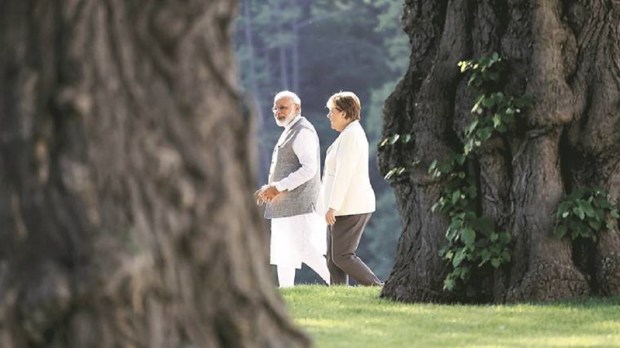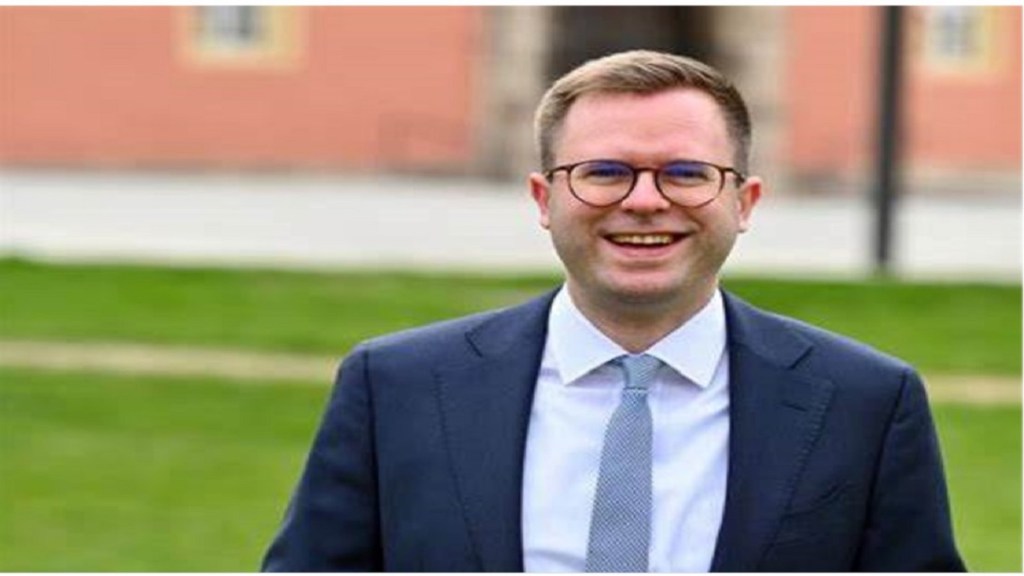Could you give us an overview of the Konrad-Adenauer Foundation and what is your foundation trying to achieve in India?
Adrian: Let me start with the work of the Konrad-Adenauer-Foundation in general: We are named after the first Chancellor of Germany, who also founded the Christian Democratic Party (CDU) after the Second World War. Today, the Konrad-Adenauer-Foundation is the largest political foundation of Germany mainly operating in the country itself.
We are the second largest provider of scholarships in Germany after the German state itself. We look after both domestic and international students. You could say that we are very active in the academic field, we have more than a hundred foreign offices around the world.
Some are bigger, like the office here in India, or the one in Washington or Tel Aviv. And then there are smaller ones. We are represented on all continents.
Our work varies greatly depending on the country we are based in. In India, we focus mainly on political dialogue, which involves us seeking to build bridges between Indian and German politicians, but also between institutions of both our countries, whether they are state institutions or civil society institutions, and of course, a big area of work covers the academic realm.
In India, we always cooperate with Indian organisations, so the Konrad-Adenauer-Stiftung never does anything on its own, that is our philosophy. We don’t know a country as well as the people who live there, so when we organise conferences or carry out studies, we always do it together with a local partner institution.
Germany is considered to be a centerpiece of liberal ideas within the European Union and is also sustained by a great deal of industrial and technological progress. So, what is your political ideology for Germany and what do you project?
Adrian: We consider ourselves a Christian democratic organisation, we have Christian roots, but outside the European context we could be described as a conservative foundation. Our values embrace the inherent dignity of each and every human being, global peace, and the social market economy; we believe in trade, and also in a rules-based domestic and international order.

These are the pillars, so to speak, and that is why we are not tied to a specific domain, we are not strictly an academic foundation, and we are not strictly a political foundation, so we try to promote these core values wherever we operate.
So that is the political part of your work. I understand your work is also closely related to the field of economic development. I mean, to a large extent, geopolitical development is related to economic development. What is your economic model?
Adrian: We believe in a social market economy, which implies a classical market economy and at the same time a strong state. We do not believe, like many liberal institutions, in a weak state, but we believe in a welfare state with strong institutions as well as a strong financial capacity.
As you can see, the German model, which is close to our heart, because Konrad Adenauer is our model, but at the same time, of course, since he was the first Chancellor of Germany, he was also the architect of this very model. When it comes to international issues, the key point for us is our strong belief in free trade, in a way that it should be based on a rules-based order, i.e., we believe that there should be a level playing field so that trade does not become a vast jungle, where the law of the strongest applies.
The second key point is that we believe that economics and politics are interdependent. You could call this philosophy ‘peace through trade’. That doesn’t mean it’s impossible, but it’s less likely, and that’s why we strongly believe that trade also has a political dimension.
What is your goal in India? India is an emerging economy and also an emerging geopolitical power. Where do you see your contribution to the Indian subcontinent?
Adrian: As I said, our purpose here in India is not to provide development aid, that is our purpose in many other countries in the world. But India is far too developed and too big, our purpose here is to foster Indo-German dialogue.
That means we provide platforms for dialogue on various policy issues, starting with the possibilities of a free trade agreement between the EU and India, security cooperation and also on digitalisation.
How do you envision working with Indian policymakers or civil society leaders on matters of political philosophy?
Adrian: We don’t preach, we don’t try to convince people to follow our philosophy, we have our own philosophy and we propagate this fact in a highly transparent manner. Take for example the issue of a potential free trade agreement between India and the EU. We try to provide platforms, to provide studies on this topic. We are service providers when it comes to this vast subject.
Ultimately, the European Commission and the Indian government have to negotiate a free trade agreement and decide whether it is worth signing or not. What we are doing is bringing Indian and German politicians, and Indian and European academics together and fostering their dialogue in order for them to find solutions to overcome potential issues holding back the finalization of closer cooperation such as is the case for the FTA.
How does Germany look at India-specific security policy, especially the Indo-Pacific strategy?
Adrian: That is a good point because if you were to ask different people in our political capital Berlin about India’s role in the global security architecture, or how intensive security cooperation should be, whether there should be arms deliveries to India, whether there should be an exchange of technology, you would get very different answers and points of view.
So, our task is to provide Germany with information. For example, if CDU politicians have questions about this issue, they ask us, and German journalists ask us as well. At the same time, we try to bring people together.
I understand that economic relations are good, but there is a big gap in the security partnership between India and Germany. Do you see that the gap is widening?
Adrian: I would like to say at the outset that I do not think economic relations are good. Part of the truth is that in 2022 we had a trade volume of Euro 32 billion euros, which is more or less balanced. But 32 billion euro is not a lot when you are talking about the fourth and fifth largest economies in the world.
Look at China and Germany, they have a 10 times larger trade volume. And when I look on the German highways, there are no Tata cars, I would not remember any Indian product that I have ever bought in Germany. I know that TATA Consulting, for example, is active in Germany, but that’s rather a B-to-B business, the medium German consumer does mostly not yet have any exposure to Indian products and services.
The only thing that is operating on a large scale within Germany is the Indian workforce. There are more than 180,000 Indians living in Germany, they represent the second largest group of foreign students.
Now to the gaps within the security cooperation. First of all, and this is also part of our task at the KAS, in India and Germany unfortunately we have very different views on India’s and Germany’s security situation.
For Europe, it has changed everything. And if you look at China, China is obviously a big threat to India, just look at Ladakh or Arunachal Pradesh. From a German point of view, however, the threat to Germany from China is much further away. the strong economic cooperation has shaped China’s image in Germany very strongly.
The second big issue I see with regard to Indo-German security cooperation is that Germany has been very restrictive when it comes to supplying arms to other countries. In other words, Germany runs a very high-tech arms industry, but its products have mostly been reserved for NATO countries, and German policies have been very restrictive when it comes to the issue of arms supplies. Unlike France, for example, where the system is different, Germany has been very restrictive, especially when it comes to India, not so much because of India per se, but because the philosophy was that there should be no arms deliveries to regions where there might be wars, which admittedly sounds strange.
You said that your interdependency with China is huge and it is about $300 billion in trade. Germany has presented itself as a country with many values based on freedom, human rights, and liberal voices, which China in particular does not have. China does not have democracy, nor does it support democracy, and it also has a bad track record of human rights violations — just think of the Xinjiang region with Muslim ghettos and internment camps. Would you be able to do justice as a nation with so much interdependence with China, how do you navigate that?
Adrian: Yes, actually the cases of Russia and China are quite similar, the German belief was or is that peace can be achieved through trade, which failed epically in the case of Russia. Until the day of the invasion, the Germans believed that Moscow would not destroy our good business relations through war.

